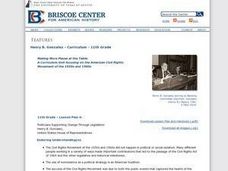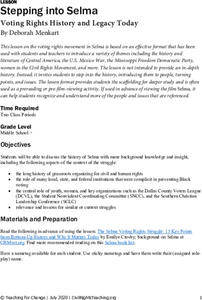Curated OER
Resistance to African American Education During and After the Civil War
Students research a web site of primary documents to determine the level of support among whites in for the education of African Americans during Reconstruction.
Curated OER
Civil Rights Movement in America
Eleventh graders explore the Civil Rights movement as a culmination of history and cultural perspectives developed from the Slave Trade and Reconstruction. They identify leading persons and organizations and their personal philosophy to...
Curated OER
African American Homesteaders
Students analyze the reasons African-Americans settled in the area to be known as Nebraska. Using primary source documents, they read about the challenges they faced and compare their growth and distribution of African-Americas in the...
Curated OER
Progress Amidst Prejudice: Portraits of African Americans in Missouri, 1880-1920
High schoolers explore and analyze a database of historical portraits of an African American family of the late 1800's. They trace the migration of one of the African Americans as he/she migrates toward urban areas.
Curated OER
What was life like for African Americans after the Reconstruction?
Students examine the origins and effects of Jim Crow laws and how specific legislation supported segregation. The lesson provides foundational, historical background for unit on the media's role in the social justice campaign of the...
Curated OER
The African-American Experience During the Vietnam Conflict
Learners examine the experiences of African-Americans in the Vietnam War. They illustrate their experiences showing how these events related to the Civil Rights movement. They compare and contrast the views of sailors and officers aboard...
Curated OER
Famous African-Americans for Animals
They research influential African-Americans who work to help animals. They recognize the contributions African-Americans have made to society and to the animal rights movement.
Curated OER
Looking at the Civil War through the lens of local history." Teaching
Students research life in Plymouth during the Civil War. Using the internet and other resources, students examine the historical effects of the Civil War. In groups, they publish a newspaper explaining the events of the day.
Curated OER
Making More Places at the Table: The American Civil Rights Movement of the 50's and 60's
Eleventh graders examine the biography of Henry B. Gonzalez. They examine primary source documents from Congressman Gonzalez's personal papers related to his contributions to the Civil Rights Movement.
Curated OER
Civil Rights and the ADA
Students examine and discuss the 14th and 15th amentments, and evaluate the agendas of Americans from underrepresented groups in the quest for civil rights. They conduct Internet research and create essays or posters regarding Civil Rights.
Curated OER
ARKANSAS SLAVES AND THE CIVIL WAR
Students discuss African American troops throughout the country during the Civil War. They, in groups, write a skit for a situation given to them by the teacher.
Curated OER
Battle Flags: Michigan and the Civil War Optional Research Assignment
Young scholars research an aspect of Michigan's involvement in the Civil War and prepare a two page research paper. They present their research findings in a news style presentation while role playing parts of a news team.
Facing History and Ourselves
After Charlottesville: Public Memory and the Contested Meaning of Monuments
Are Civil War monuments a kind remembrance or a reminder of a dark past? The instructional activity focuses on the public's memory of the Civil War and the monuments that represent it. Young academics explore past efforts to change...
Teaching Tolerance
Jim Crow as a Form of Racialized Social Control
Just because slavery was illegal doesn't mean it went away ... Jim Crow Laws took its place. An eye-opening lesson focuses on how Jim Crow Laws were used as a form of racial social control against African Americans in the United States....
DocsTeach
Analyzing Jackie Robinson's White House Letter
Jackie Robinson: A hero on and off the field. An eye-opening activity focuses on Jackie Robinson's social activism during and after the civil rights movement. Academics read a letter addressed to President Nixon, answer questions, and...
DocsTeach
The Impact of Bloody Sunday in Selma
Who is to blame when a peaceful protest turns deadly? Scholars research the impact of the civil rights march in Selma, better known as Bloody Sunday. The activity uses files from the FBI's investigation to help academics understand the...
DocsTeach
The Path of Justice: Selma and the Voting Rights Act
The civil rights movement: An ongoing battle for change. The activity focuses on President Johnson's speech in response to the massacre at the Selma March. Academics study the speech, complete a hands-on-activity, and discuss President...
Smithsonian Institution
Separate is Not Equal: Fight for Desegregation
Separate is not equal! An eye-opening lesson delves into the past to understand the fight for desegregation and how it impacted African American communities. Academics complete two one-hour lessons using documents, photographs, and...
Lehigh University
Glory (1989) - Should it be Shown in Class?
This is a fantastic activity that prompts learners to think like educators and consider the value of a historically based film beyond just the accuracy of information. Your young historians will work in groups to do a close reading and...
Teaching for Change
Stepping into Selma
The 1964 Selma to Montgomery, Alabama voting rights marches are the focus of a lesson designed to introduce learners to people who took part in the Civil Rights Movement. Class members set into the role of one of the participants,...
American Chemical Society
Norbert Rillieux, Thermodynamics and Chemical Engineering
The man who invented the earliest examples of chemical engineering was an American-born, French-educated, free man of color before the Civil War, and went on to translate Egyptian hieroglyphics. There is something of interest for almost...
Teaching Tolerance
Mass Incarceration as a Form of Racialized Social Control
Mass incarceration: A result of a tough stance on crime or racial discrimination, you decide. Academics explore the history and reasons behind mass incarcerations in the United States and its impact on ethnic communities. The...
Teaching Tolerance
The War on Drugs—Mechanisms and Effects
The war on drugs doesn't have definite results. An interesting lesson examines the social, political, and economic effect of the war on drugs. Academics learn how the war on drugs has led to mass incarcerations and negatively affected...
Teaching Tolerance
Racial Disparity in the Criminal Justice System
Explore the impact of the war on drugs in a thought-provoking lesson for high school academics. Young historians delve into the world of the criminal justice system and the racial disparity that occurs in the US. The resource provides...

























